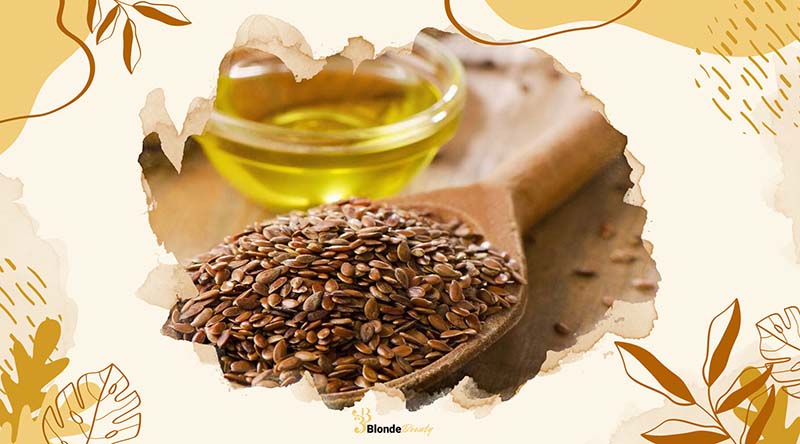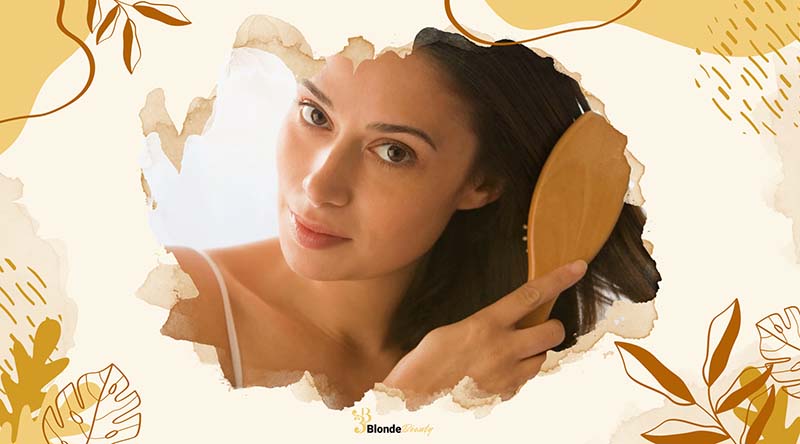Flaxseed offers numerous benefits for hair health. These tiny seeds are loaded with omega-3 fatty acids, vitamin E, and antioxidants, all of which are key for promoting longer, more lustrous hair.
Regular use of flaxseed can enhance hair texture, nourish hair follicles, and contribute to overall hair vitality.
Keep reading to discover more about flax seeds benefits for hair and learn how you can use flaxseed to promote hair growth.
Does Flaxseed Cause Hair Loss?
Flax seeds are a powerhouse of nutrients that significantly benefit hair health. These tiny seeds are packed with B vitamins, which not only stimulate hair growth but also strengthen hair strands, promoting both stronger and faster growth.
Flax seeds are also rich in omega-3 fatty acids. Although the type of omega-3s in flax seeds is different from those found in fatty fish, they are still highly beneficial for heart health and in reducing inflammation, making them an excellent alternative for vegetarians.
Using flaxseed oil, either topically or as a dietary supplement, offers benefits similar to those of other plant-based oils. It effectively seals the hair cuticle, which helps prevent frizz and breakage. Moreover, the vitamin E found in flaxseeds plays a crucial role in combating free radicals on the scalp, enhancing sebum production, and maintaining overall scalp health.

Benefits of Flax Seeds for Hair Growth
Flax seeds offer a multitude of benefits for promoting hair growth and overall hair health. Here are some of the key benefits:
Moisturizes Curly Hair
Flaxseed is renowned for its remarkable ability to moisturize curly hair. Rich in essential nutrients, it can deeply penetrate your strands, ensuring they are thoroughly nourished.
Incorporating flaxseed into your conditioners, hair growth oils, and anti-hair fall shampoos will significantly enhance your hair’s beauty.
Nourishes All Hair Types
Flaxseed offers complete nourishment for all hair types. Loaded with vitamin E and omega-3 fatty acids, using flaxseed oil for your hair ensures it remains smooth and healthy.
It is considered one of the top hair care tips for maintaining vibrant hair.

Strengthens Hair Quality
In terms of strengthening hair quality, flaxseeds are invaluable. They are a rich source of omega-3 fatty acids and vitamin E, which bolster hair strength and prevent breakage.
Flaxseeds also alleviate scalp inflammation, promoting healthy hair growth. For enhanced effects, consider blending flaxseed oil with blackseed oil, as both offer complementary benefits for hair care.
Prevents Dandruff
Flax seeds are also effective in preventing dandruff by protecting and nourishing the scalp, thus inhibiting the growth of dandruff-causing microbes.
Regular inclusion of flaxseed in your hair care regimen ensures a lustrous and dandruff-free scalp.
Restores Dry and Damaged Hair
Moreover, flaxseed is instrumental in restoring dry and damaged hair.
The vitamin E in flaxseed is vital for preventing and repairing hair damage, fighting free radicals, and reducing scalp inflammation, which adds lustre and increases the elasticity of your hair.
Protects Your Hair
Regular use of flaxseed protects your hair from environmental stressors, resulting in stronger, healthier hair.
It also helps prevent split ends by strengthening your hair strands, which minimizes breakage and keeps split ends at bay.

Prevents Split Ends
Flax seeds strengthen your hair strands, ensuring minimal to no hair breakage. They also prevent split ends, leaving you with healthy hair strands.
Soothes Irritated Scalp
For those with an irritated scalp, flaxseed’s rich content of omega-3 fatty acids can reduce inflammation and scalp sensitivity.
It helps balance scalp pH and oil production, soothing the sebaceous glands to ensure optimal sebum production for healthy hair growth. Alongside flaxseed, sesame oil also offers numerous benefits for hair health.
Stimulates Hair Growth
Flaxseed stimulates hair growth by supplying the scalp with all the necessary nutrients it requires for robust hair growth.
Regular application keeps scalp issues at bay and maintains scalp moisture.
Prevents Hair Loss
Lastly, flaxseed prevents hair loss effectively. Known as a nutritional powerhouse, adding this ingredient to your hair care routine will visibly strengthen your strands and reduce hair loss, thanks to its abundant fatty acids and vitamins.

How to Use Flaxseed For Hair Growth
There are several methods to harness the benefits of flaxseed for hair health. For direct application to your hair, it’s best to use flaxseed oil rather than whole or crushed seeds.
Flaxseed oil is readily available in both the cooking oil aisle of your grocery store and in specialty wellness shops.
To use flaxseed oil as a hair mask, simply warm a small amount in your hands and massage it into your hair. Leave it on for up to 15 minutes, then rinse and shampoo as usual.
Flaxseed oil can also be used as a pre-conditioning treatment. After shampooing, apply the oil and rinse it out before applying your regular conditioner.
Additionally, you can create a flaxseed gel, which is ideal for daily styling. Unlike a mask, this gel is meant to be left in the hair until your next wash, providing ongoing nourishment and styling hold.
Flaxseed oil is also available in capsule form as a dietary supplement. However, it’s important to consult with a healthcare provider before starting any supplement regimen, as there can be risks associated with flaxseed oil supplementation.
Depending on the brand, the recommended dosage of flaxseed capsules can vary, with some suggesting up to six capsules daily.
Another way to enjoy flaxseed’s benefits is by eating the crushed seeds, which add a nutty flavor to foods like oatmeal, salads, and grains.
With regular use, the fatty acids and antioxidants in flaxseed can make your hair smoother and stronger. Remember, though, that while flaxseed is potent, it should be part of a well-rounded diet for the best results in hair health and overall wellness.

Risks of Using Flaxseed Oil
While flaxseed oil is a natural, plant-based food source, it is not without its risks. Potential side effects include gastrointestinal issues such as abdominal cramps, bloating, gas, diarrhea, and constipation. Additionally, there is a risk of toxicity from consuming unground, unripe seeds.
Other concerns with flaxseed oil include decreased blood pressure and a possible increased risk of prostate cancer. Flaxseed also contains a higher level of estrogens, which may adversely affect a fetus during pregnancy.
Furthermore, flaxseed and its oil can interact with various medications, particularly blood thinners, cholesterol medications, and insulin used for diabetes management. Topical use of the oil may also cause skin sensitivity.
Moreover, while flaxseed oil is a source of omega-3 fatty acids, it’s important to note that the omega-3s in flaxseed need to be converted into DHA and EPA before the body can utilize them effectively. This conversion process results in only a fraction of the omega-3s being absorbed.
For those looking to increase omega-3 intake, consuming fatty fish or taking fish oil supplements might be more effective. Flaxseed oil alone may not provide sufficient omega-3s for optimal health benefits.
How Often to Apply Flaxseed Oil to Hair
The frequency with which you should use flaxseed on your hair can vary depending on individual needs and hair type.
However, generally, flaxseed can be applied to your hair daily or as often as needed to achieve the best results. Regular use helps in maximizing the nourishing benefits of flaxseed, promoting healthier, stronger, and more lustrous hair.
Conclusion
Flaxseeds and flaxseed oil are excellent plant-based supplements that offer many health benefits and can be added to your daily diet. However, consuming flaxseed internally may not be suitable for everyone.
For an immediate boost in hair texture and condition, applying flaxseed oil topically can work wonders. Whether you opt to ingest flaxseed or apply it directly to your hair, integrating flax seeds benefits for hair into your routine is key.
Complementing this with other healthy hair care practices, such as regular trims, proper shampooing, and consistent conditioning, is crucial for maintaining overall hair health and achieving the best results.
Don’t forget to check out more blogs from Blonde Beauty for additional tips and insights on achieving your best hair ever.

Laureate Professor Clare Collins
Professor Clare Collins is a leading expert in nutrition and dietetics at the School of Health Sciences, part of the College of Health, Medicine and Wellbeing. Her work is changing the way we think about food and health. She grew up as one of nine children and was the first in her family to finish high school and go to college. This background gave her a strong work ethic and a deep appreciation for seizing opportunities.
As the Director of the Hunter Medical Research Institute’s Food and Nutrition Program and a recipient of three NHMRC Research Fellowships, Professor Collins is making a big difference in public health. She focuses on helping people who are often overlooked, using new technologies like apps and online programs to improve their nutrition and reduce the risk of chronic diseases.
Professor Collins is well-respected and has been recognized as a Fellow in four major health and science organizations. She leads a diverse team of experts, including dietitians, computer scientists, and engineers, working together on global health projects.
Her achievements are impressive. She has received over $29 million in research funding, published more than 450 papers, and helped 35 PhD and Master’s students complete their degrees. She’s also active in sharing her knowledge with the public. She has developed tools like the Australian Eating Survey and the Healthy Eating Quiz, and she often appears in the media to talk about nutrition.
PUBLISHED ARTICLES
- Collins, C. (2019). “The Effect of a Pilot Dietary Intervention on Pain Outcomes in Patients Attending a Tertiary Pain Service.”
- Collins, C. (2022). “Variation in cardiovascular disease risk factors among older adults.”
- Collins, C. (2022). “Evaluation of an online intervention for improving stroke survivors’ health-related quality of life: A randomised controlled trial.”
These articles show Professor Collins’s commitment to understanding how better nutrition can improve health. Her work is important for researchers, doctors, and anyone interested in healthy living.
